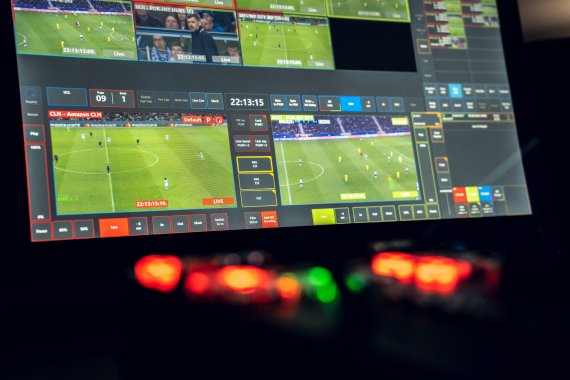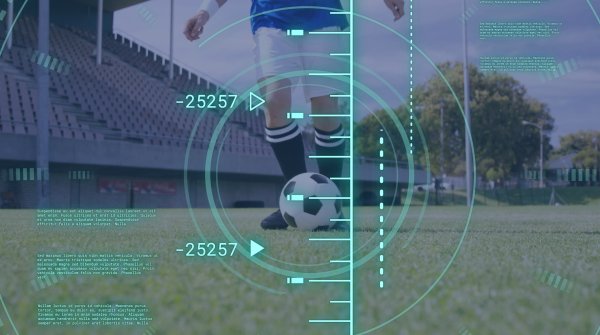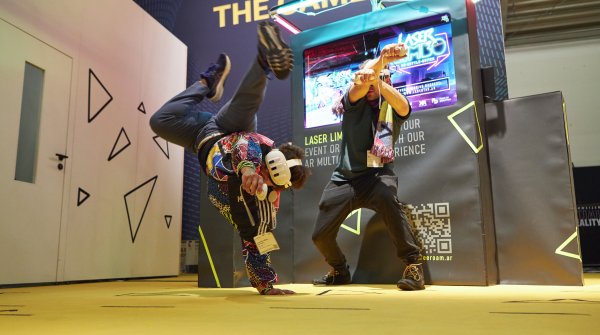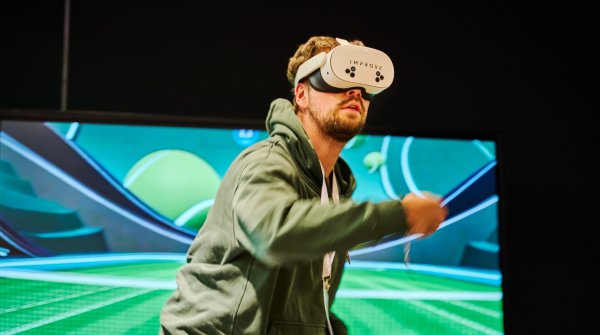Every year in April, broadcasters from all over the world flock to Las Vegas to discover the latest production trends and products at the NAB Show. The fact that AI has long since found its way into production technology is no great surprise. The speed at which this is happening is. Not all technologies will find their way into everyday production - but some tools certainly have the potential to revolutionize sports broadcasting.

As a provider, Amazon Web Services (AWS) was an early adopter of AI and uses a lot of computing power and countless data points to provide statistics and evaluations in the sports sector - for example for the Bundesliga. AWS Match Facts provides soccer fans with in-depth insights into the game and can, for example, call up goal probabilities and statistical data on players.
As a "Generative AI Provider" of the German Football League (DFL), AWS wants to offer much more in the future: In the area of fan experience, automated translations, personalization and localization are to be created in the future with the help of AWS AI. AWS AI will also be increasingly used in media production and video archiving.
Assistive AI vs. generative AI
There are already a number of AI solutions that support people in their daily work. These assistive AI systems are mostly used for repetitive, time-consuming and generally less creative tasks. Generative AI, on the other hand, can do more. It recognizes patterns from the data with which it is trained. It draws conclusions from this and applies what it has learned to write new texts, create images or even videos, for example. Problem: Generative AI can sometimes be wrong if it is not carefully monitored and regulated. Nevertheless, it is already in widespread use. Many users find that the advantages outweigh the disadvantages of using Adobe Firefly, Midjourney, ChatGPT and other generative AIs.
AI is also providing a boost in sports coaching because there are now many more tools available to visualize and compare movement sequences, for example. Such analysis systems have become indispensable in sports reporting, especially in soccer. Whether coaching or reporting, this form of analysis has only been possible since AI has been able to process all the data that is collected.
In research, AI is also paving the way for further sports science studies in competitive sport. For example, the German Sport University Cologne recently announced that it has been selected for a joint project with the TIB - Leibniz Information Center for Science and Technology and University Library on the AI-supported analysis of sports videos from the German Research Foundation (DFG).
For several years now, there have been attempts to automate the production of visual sports content, particularly in the lower leagues, and thus ensure greater visibility, especially in club sports. AI has made such systems possible in the first place. As a rule, cameras are used that follow the action via AI tracking and then stream it to the internet or make it available for viewing. In some cases, these streams are also available for further analysis, for example for tactical analysis, as a tool for coaches or as a basis for fan TV.
Pixellot from Israel develops such solutions. The manufacturer's systems are characterized by a combination of artificial intelligence, machine learning, stationary and portable camera systems, software and cloud computing.
What comes out at the end of a Pixellot production looks like professional sports reporting. The system even automatically generates "highlight clips", for example of players who have scored. What the manufacturer sees as the unique selling point of its products is the wealth of content that is produced with Pixellot systems. According to the company, more than 150,000 games are broadcast every month in around 80 countries. This feeds the Pixellot AI, making it better and better - and thus also increasing the quality of the productions. These systems for automated sports production are usually offered as a subscription model. With the entry-level packages, clubs can produce and advertise their teams' matches even with a small budget.
Sports productions are often about creating content as quickly as possible. However, this is only possible if the editors can easily find the relevant scenes and clips during editing. This is exactly where semantic search comes in, as it offers much more than searching via metadata or tags. A concrete example: If you search for the term "peaceful" in the clip archive using the semantic search, you will get a clip of a sleeping cat as well as a sunset or rolling hills as a result. For editors looking for archive, edited, near-live or live material, this opens up completely new possibilities for finding content.
There are a number of companies working on integrating this functionality into their asset management systems. One of these is the Fonn Group from Norway, whose MAM system Mimir is pursuing a cloud-based production approach. Incidentally, this has also enabled Dyn Media with this approach. The German streaming service uses Mimir for the production of its program. The Berlin-based company Obvious Future goes one step further with its product Cara One. CEO Eddi Weinwurm: "We wanted to develop an AI that doesn't feel artificial, which is why we call Cara One an intelligent media assistant and not an artificial intelligence. Cara One enables a search with an understanding of the world, so to speak".
However, the underlying AI technology from Cara One makes much more possible. For example, Obvious Future showed "predictive editing" in a demo. The AI analyzes existing raw material, from which, for example, a two-minute piece is to be created, and suggests suitable cuts in a kind of flow chart. Editors can work their way through scene by scene and create an entire piece based on the AI's suggestions.
Hardly any sport is covered without slow motion. However, not every production has the budget to use the expensive high-speed cameras required for this. It is also often the case that the production teams cannot set up a slomo camera in every position at the event location and can only fit smaller, more compact cameras.
In such cases, AI can help. There are now a number of providers that can generate slowmotions using software. EVS, for example, has developed XtraMotion a solution that uses AI to calculate a superslomo from a camera signal with a normal frame rate. The special thing about it: XtraMotion only needs a few seconds to do this, so that the calculated slomos can be used immediately in the TV broadcast.

Thanks to AI, high-quality slow motion does not always have to be expensive, as Riedel Communications proves with its RiMotion solutionwhich combines extensive replay functions, including super-slow motion support, with an innovative, user-friendly interface. Other manufacturers are now also able to offer slow motion using AI-driven solutions, such as TVU Networks or Blackmagic Design. An iPhone can also be the source for replays.
The start-up ElevenLabs has only been around for two years, but the company has already caused quite a stir. ElevenLabs specializes in cloning and synthesizing voices in different languages - based on machine learning. And it works incredibly well.
With the AI Voice Generator, it is possible to convert text into speech - in a matter of seconds and in a wide variety of languages and voices. You can even use Voice Clone to clone your own voice, which can then speak any text. This is at least as impressive as it is frightening.
Dubbing Studio is currently able to translate audio clips or the sound of videos into 29 languages. And the great thing is that it can even do this in the voice of the original - so a German-language sports commentary is available with the original voice in a wide variety of languages at a stroke. For the sports production market, this technology offers incredible potential for the localization of content.
AI recognizes users' preferences and makes it easier to provide personalized content. For example, fans can discover new content, but also receive more content from their favorite club. TVXRAY from Teravolt offers a wide range of personalization options for broadcast and OTT services to enhance the live sports experience: from features such as highlight clips from each match, instant live stats and personalized video alerts to an interactive match overview. TV Buddy, also from Teravolt, takes a different approach. This is a second-screen application that makes data available in chat form. Viewers can ask questions via their messenger, for example WhatsApp, and receive answers from their "TV Buddy". These tools all have one overarching goal: on the one hand, they should ensure more interaction with fans and, on the other, offer more incentives to stay on the respective platform for as long as possible.
OTT
OTT services (over-the-top services) are streaming services that provide media content such as videos, music and other digital content directly over the internet without a traditional cable or satellite provider in between. Well-known examples of OTT services are Netflix, Amazon Prime Video and Spotify. These services offer users the opportunity to consume content on various devices such as smartphones, tablets, smart TVs and computers.
AI definitely enables more efficient and, in the long term, interactive sports reporting. Developments in generative AI in particular, which automates creative and analytical processes, are of central importance here. However, it is often still challenging for broadcasters and production companies to integrate AI tools into their workflows, decide on the right tools and maintain an overview. But: AI is here to stay. Those who take advantage of its benefits early on will have a head start.
 SportsTechUnlocking the Future of Sports with AI
SportsTechUnlocking the Future of Sports with AI
- ISPO awards
- Mountain sports
- Bike
- Design
- Retail
- Fitness
- Health
- ISPO Job Market
- ISPO Munich
- ISPO Shanghai
- Running
- Brands
- Sustainability
- Olympia
- OutDoor
- Promotion
- Sports Business
- ISPO Textrends
- Triathlon
- Water sports
- Winter sports
- eSports
- SportsTech
- OutDoor by ISPO
- Heroes
- Transformation
- Sport Fashion
- Urban Culture
- Challenges of a CEO
- Trade fairs
- Sports
- Find the Balance
- Product reviews
- Newsletter Exclusive Area
- Magazine





